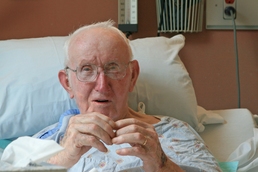Allowing people to die at home could save NHS millions say Marie Curie Cancer Care

Giving people the right to die at home could make savings of £34 million estimate Marie Curie Cancer Care. The charity says by reducing the hospital stay of 30,000 patients (approximately 12% of those who currently die in hospital in England each year) by just four days, substantial savings could be made.
Research shows that 65 per cent of people would prefer to die at home if they had a terminal illness, but half of cancer deaths happen in hospital - the place patients say they would least like to be.
Marie Curie has been campaigning for more patients to make their own choice of where to be cared for and where to die since 2004 and they have published a briefing which summarises evidence on how the NHS savings could be achieved. Their service design specialists have been bringing together commissioners and providers from the public, independent, and voluntary sectors to ensure that more people at the end of life can be cared for and die at home.
Imelda Redmond CBE, director of policy and public affairs at Marie Curie Cancer Care said: ‘The NHS has to save £20 billion by 2015. Savings on the scale required can only be achieved through service redesign that can be rapidly implemented across the NHS. Ensuring that more people who are terminally ill are able to be cared for and die at home can release funds. Even small reductions in the number of days people at the end of life spend in hospital can lead to substantial savings. The National Audit Office found that a reduction of just 10% in emergency admissions and of three days in hospital stay could save the NHS £104 million. But we think we can help the NHS to achieve even more.’
In rural areas of East Riding, Marie Curie nurses visit and provide telephone support to patients needing symptom control between 6pm and 11pm, seven days a week. This service also identifies people needing the Marie Curie night service at short notice, preventing emergency out of hours’ acute admissions. In a six-month period the service provided care for 183 patients.
Neil Griffiths, Assistant Director of Joint Commissioning, NHS East Riding said: ‘We have a good relationship with Marie Curie and enjoy working with them. Their flexibility allows us to work constructively together to change the way services are delivered. Marie Curie’s reputation counts for a lot with patients and families. Caring for someone at home who may be in pain is an emotional strain for carers. Knowing that they will be supported by nurses who work specifically in palliative care makes a huge difference.’
Marie Curie’s rapid response service provides the people of Conwy, Denbighshire, Flintshire and Wrexham with access to a 24-hour palliative care service. Marie Curie nurses provide urgent symptom control and psychological and social support to people needing end of life care at home or in care homes. Over 600 admissions have been avoided so far, saving an estimated £1.4million.
Latest News
 29-Jul-24
Dementia Bus gives carehome.co.uk staff insight into life with dementia
29-Jul-24
Dementia Bus gives carehome.co.uk staff insight into life with dementia
 27-Jul-23
UK's top home care agencies in 2023 revealed
27-Jul-23
UK's top home care agencies in 2023 revealed
 30-Nov-22
A quarter of older people keep their falls secret from family
30-Nov-22
A quarter of older people keep their falls secret from family
 29-Nov-22
'Covid-19 has not gone away' say terminally ill
29-Nov-22
'Covid-19 has not gone away' say terminally ill
 28-Nov-22
IT consultant who received poor care opens 'compassionate' home care business
28-Nov-22
IT consultant who received poor care opens 'compassionate' home care business